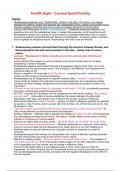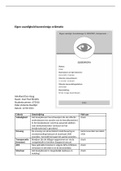Essay
A Level Edexcel English Lit - Paper 1 Twelfth Night Theme Essay Plans
Includes 8 detailed A* A Level Edexcel English Lit Twelfth Night Theme essay plans. I got an A* in my English Lit A-Level last year, these essay plans are perfect for revision! All reviewed by teachers, contains key quotes with deep analysis, unique context and links to AO5 critics!
[Show more]





